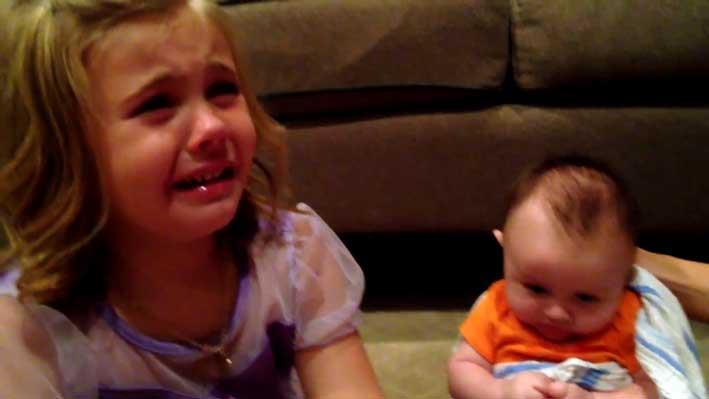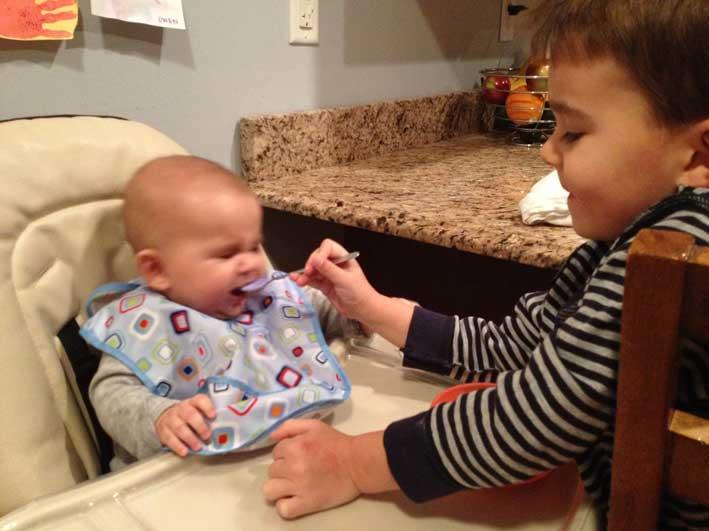The arrival of a little brother or sister is both an exciting, happy event, and one that brings questions and insecurities for the children that came before. Preparation for its arrival is the key.
A child's reaction to a new baby can be influenced by so many things; their age when it is born, their position in the family, even the gender of the new baby and the age gap between them. Baring in mind the upheaval this tiny person causes for its parents, who have a clear understanding of what is going on, it is not very surprising when children too are likely to be overcome by the event.
Generations ago, when children were less exposed to the mysteries of life than they are nowadays, it was not unusual for baby to appear 'from nowhere', and be proudly presented as a new brother or sister. Any questions of on how or why were answered with a string of mythology involving bushes, doctor's bags, angels and even the postal service!
Today's children receive factual explanations, with whatever details their parents feel appropriate. In all likelihood they will happily broadcast their interpretation of this information to their friends. Be prepared for fallout from the school!

When to tell
The announcement of a new baby should be made in time to build up an aura of excitement and anticipation but not so far in advance that it becomes a boring wait and the child either loses all interest or grows to resent a load of build up that doesn't seem to going anywhere.
Siblings should be told before or with other family members. Hearing the news from someone else could certainly confuse and upset even quite young children and seriously embarrass the older ones..
Telling teens
Teenagers, naturally, need to be told the news as soon as possible because they will have all sorts of emotional adjustments to make. Tell them when there are no other children around and, since most of them can never imagine their own parents capable of such a thing, be prepared for shock, horror and the proclamations that you have ruined their lives and their world has ended.
This is hardly surprising. Their main concerns will be about what their friends will think, whether the new child will be competition, and even how much 'baby-sitting' and child care they may be expected to give it. With patience, by focusing as much as ever, if not a bit more, on them, and by mentioning the baby only in passing at first, you will convince them that their place in the family and your heart will not be any different.
And even if they seem thrilled to bits remember that they may still have several concerns so make sure they know you are open to discussing these. Talk about who the baby might resemble or take after. Think of names and what it will be like, welcoming a little newcomer into the family and what changes it will mean.
They also deserve to be involved in any preparations they would like to share and do welcome any support they want to give. It will make a real difference to how they feel when the baby actually arrives.

Great expectations.
Even children who 'long' for a brother or sister may have second thoughts when the idea becomes a reality. The novelty may quickly wear off when they discover that what they imagined would be an instant playmate or companion is in reality a demanding little creature who can turn the whole house upside down without even being able to sit up on its own.
Make it very clear to younger children that babies need a lot of nurturing before they can do everything their big brothers and sisters can do. You could even show them photos from when they were newborn to illustrate how delicate and helpless they were at first.
Explain why babies sleep a lot and that it's a good idea not to wake them while they do. If they can have your undivided attention for some time while the baby sleeps, they will see it as a good thing and make an effort not to wake it up.
Reassure children who will eventually be sharing their bedroom that their space and possessions will still be theirs. Involve them in making any changes, and make sure they understand why these are necessary. Also, explain in advance why the baby might sleep for a while in your room; otherwise they could well imagine that it is a substitute for them after all. Including children of any age in getting cots, clothes and toys ready for the baby will make them feel they have an important part to play. And finding little treats for them at the same time will increase their goodwill towards the baby as well.
Nearer to the birth decide where the children will be staying on the due date and let them know whatever arrangements you have made well in advance.

Welcome home
Some parents take older children to accompany their new sister or brother home, Others choose for their children to stay with a close relative or friend, so they can have the first night home alone with their new baby. But most bring the baby home to meet the family, who will be longing to welcome it. If the baby is dressed in the clothes chosen by its brothers and sisters, and there are little gifts for them to exchange, they will soon feel that this baby is truly a new family member. But there should be a celebration treat planned just for the older sibling/s to emphasise how special they are too.
As the family settles down, there will be a lot of adjustments to make. However enthusiastic children may seem at the beginning the reality of a new 'person' in their home and the attention they demand from you may be too much for some children. The very little ones may genuinely fear for their survival, and resent having to share you with the newcomer to a point where their behaviour deteriorates. Older ones can find it at the very least disturbing and over react too. Exhausting as it all is, sympathise with each other and share your feelings to impress on them that you do understand but, for the time being, it is what it is. Then make the most of all the cute, amusing times with the baby, together whenever possible. This is only the early stage. Ensure they relate to and accept this fact, in a way that each one understands.
Soon enough the little one will respond to their attention and flatter them with a grin or a giggle, finish a bottle they have given it, or fall asleep in their arms and they will be totally won over.
